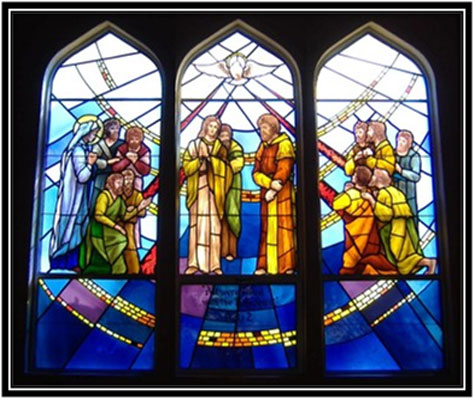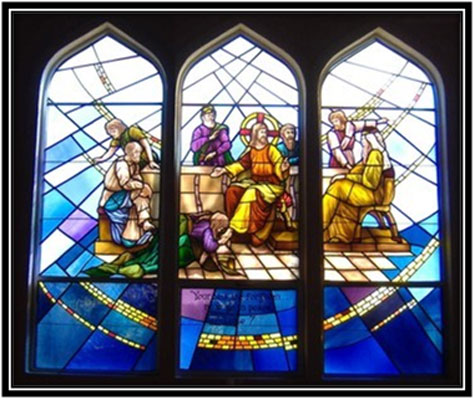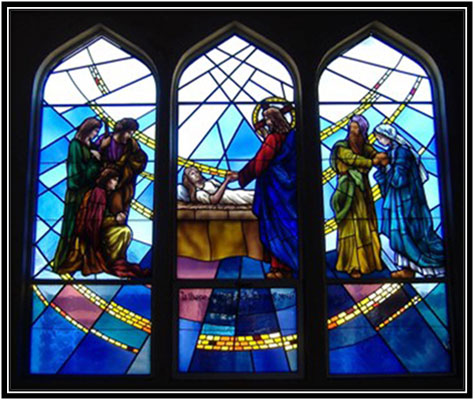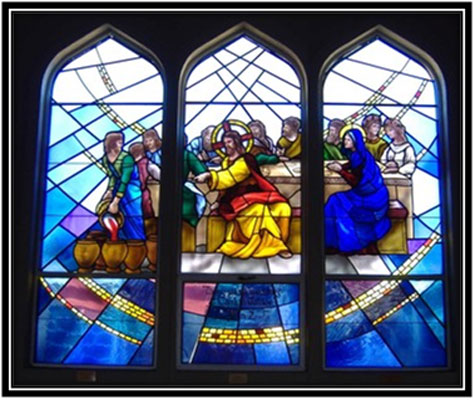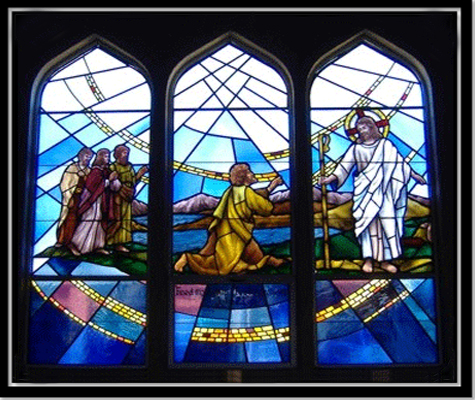Celebrating the Seven Sacraments
Sacraments of Initiation
Christian initiation is accomplished by three sacraments together: Baptism which is the beginning of new life; Confirmation which is its strengthening; and the Eucharist which nourishes the disciple with Christ's Body and Blood for his transformation in Christ (Catechism 1275).
The sacraments of Christian initiation...lay the foundations of every Christian life...By means of these sacraments of Christian initiation, they thus receive in increasing measure the treasures of the divine life and advance toward the perfection of charity (Catechism 1212).
Baptism
Holy Baptism is the basis of the whole Christian life, the gateway to life in the Spirit, and the door which gives access to the other sacraments. Through Baptism we are freed from sin and reborn as sons of God; we become members of Christ, are incorporated into the Church and made sharers in her mission: "Baptism is the sacrament of regeneration through water and in the word" (Catechism, 1213).
Incorporated into Christ by Baptism, the person baptized is configured to Christ. Baptism seals the Christian with the indelible spiritual mak (character) of his belonging to Christ (Catechism 1272).
Confirmation
The effect of the sacrament of Confirmation is the special outpouring of the Holy Spirit...which brings an increase and deepening of baptismal grace (Catechism 1302-1303).
Confirmation...is the sacrament which gives the Holy Spirit in order to root us more deeply in the divine filiation, incorporate us more firmly into Christ, strengthen our bond with the Church, associate us more closely with her mission, and help us bear witness to the Christian faith in words accompanied by deeds (Catechism, 1316).
Holy Eucharist
The Eucharist is "the source and summit of the Christian life." "The other sacraments, and indeed all ecclesiastical ministries and works of the apostolate, are bound up with the Eucharist and are oriented toward it. For in the blessed Eucharist is contained the whole spiritual good of the Church, namely Christ himself, our Passover" (Catechism, 1324).
During consecration, the bread and wine are transubstantiated into the Body and Blood of Christ. Under the consecrated species of bread and wine Christ himself, living and glorious, is present in a true, real, and substantial manner: his Body and his Blood, with his soul and his divinity (Catechism 1413).
Sacraments of Healing
Through the sacraments of Christian initiation, man receives the new life of Christ. Now we carry this life "in earthen vessels," and it remains "hidden with Christ in God." We are still in our "earthly tent," subject to suffering, illness, and death. This new life as a child of God can be weakened and even lost by sin (Catechism 1420).
The Lord Jesus Christ, physician of our souls and bodies, who forgave the sins of the paralytic and restored him to bodily health, has willed that his Church continue, in the power of the Holy Spirit, his work of healing and salvation, even among her own members. This is the purpose of the two sacraments of healing: the sacrament of Penance and the sacrament of Anointing of the Sick (Catechism 1421).
Penance
"'The whole power of the sacrament of Penance consists in restoring us to God's grace and joining us with him in an intimate friendship.' Reconciliation with God is thus the purpose and effect of this sacrament. For those who receive the sacrament of Penance with contrite heart and religious disposition, reconciliation 'is usually followed by peace and serenity of conscience with strong spiritual consolation.' Indeed the sacrament of Reconciliation with God brings about a true 'spiritual resurrection,' restoration of the dignity and blessings of the life of the children of God, of which the most precious is friendship with God." (Catechism 1468)
Anointing of the Sick
The Sacrament of Anointing of the Sick is "a particular gift of the Holy Spirit. The first grace of this sacrament is one of strengthening, peace and courage to overcome the difficulties that go with the condition of serious illness or the frailty of old age. This grace is a gift of the Holy Spirit, who renews trust and faith in God strengthens against the temptations of the evil one, the temptation to discouragement and anguish in the face of death. This assistance from the Lord by the power of his Spirit is meant to lead the sick person to healing of the soul, but also of the body if such is God's will. Furthermore, 'if he has committed sins, he will be forgiven.'" (Catechism 1520).
Sacraments at the Service of Communion
Baptism, Confirmation, and Eucharist are sacraments of Christian initiation. They ground the common vocation of all Christ's disciples, a vocation to holiness and to the mission of evangelizing the world. Two other sacraments, Holy Orders and Matrimony, are directed towards the salvation of others; if they contribute as well to personal salvation, it is through service to others that they do so. They confer a particular mission in the Church and serve to build up the People of God (Catechism 1533-1534).
Holy Matrimony
The marriage covenant, by which a man and a woman form with each other an intimate communion of life and love, has been founded and endowed with its own special laws by the Creator. By its very nature it is ordered to the good of the couple, as well as to the generation and education of children. Christ the Lord raised marriage between the baptized to the dignity of a sacrament." (Catechism 1660)
The grace of this sacrament is intended to perfect the couple's love and to strengthen their indissoluble unity. By this grace they "help one another to attain holiness in their married life and in welcoming and educating their children" (Catechism 1641).
Holy Orders
Holy Orders is the sacrament through which the mission entrusted by Christ to his apostles continues to be exercised in the Church until the end of time: thus it is the sacrament of apostolic ministry. It includes three degrees: episcopate, presbyterate, and diaconate" (Catechism, 1536).
This sacrament configures the recipient to Christ by a special grace of the Holy Spirit, so that he may serve as Christ's instrument for his Church. By ordination one is enabled to act as a representative of Christ, Head of the Church, in his triple office of priest, prophet, and king (Catechism 1581).

